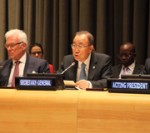
Successful implementation of the post-2015 agenda will hinge on a strong and comprehensive financing framework for sustainable development. The business sector and civil society play a vital role in this context. Ahead of the Third International Conference on Financing for Development in Addis Ababa in July, the General Assembly held informal interactive hearings with civil society and the business sector on April 8-9 to fully take their views into account.
The hearings fostered dialogue between Member States and non-governmental actors on substantive issues related to the Conference in Addis Ababa (13-16 July 2015), in particular the draft outcome document of the Conference. The first day was dedicated to interactive exchanges with business leaders.
“I urge private sector leaders, including CEOs, to join us in Addis Ababa, and to consider new commitments for investment in sustainable development – including in the vital area of infrastructure”
Ban Ki-moon, United Nations Secretary-General
“I urge private sector leaders — including CEOs — to join us in Addis Ababa, and to consider new commitments for investment in sustainable development – including in the vital area of infrastructure”, said the United Nations Secretary-General at the opening of the meeting.
“Both greater quality and quantity of private investment into infrastructure is needed,” added Veronica Zavala, moderator and General Manager of Strategic Planning and Development Effectiveness at the Inter American Development Bank, underling how the rapid pace of urbanisation during the next fifteen years will require extended action in spreading and sustaining economic growth outside the cities.
Many businesses shy away from long-term investments, because the return on investment is out of immediate sight.
However, Ms. Orli Arav, MD of Emerging Africa Infrastructure Fund, shared her expereinces on how long term investments in infrastructure can be profitable, an observation that finds support in resarch findings, showing a one percent growth in GDP for every ten percent investment in infrastructure.
Another important component in financing for development is job-creation. A primary engine for this are Small Medium Enterprises (SMEs), representing the majority of permanent full time employment in developing countries.
“Potential of SMEs remains unrealized because of lack of access to finance,” said Matthew Gamser, session moderator and CEO of the G20 SME Finance Facility, underlining the fact that access to capital is a major obstacle in the development of small businesses. Banks and other financial institutions often find them risky to service. In view of this, the panel discussed how to better cater for the financial needs of SMEs.
On the second day of the hearings, representatives from civil society shared their views on financing for development. “Civil society actors have a critical role to play in the outlining of a successful post-2015 sustainable development agenda,” declared Mr. Nicholas Emiliou on behalf of Mr. Sam Kutesa, President of the General Assembly.
Key issues of the Financing for Development agenda were discussed, such as Official Development Assistance (ODA) and external debt. The panels also reasoned about international tax cooperation in hope of preventing capital flight in developing countries.
